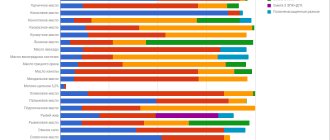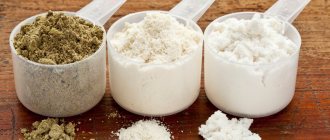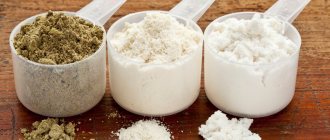What's the most important thing for geeks? For the brain to work well and for a long time, maybe virtual technology will catch up, and digitization will catch up, and you won’t have to worry so much about the body, and a bunch of other troubles will disappear by themselves.
In this article we will look at whether fish oil helps prolong life and protect the brain in old age.
Some authors of books on life extension and preventing decline in brain function at 80+ years of age consider taking fish oil one of the important components of the action program. It is also one of the most studied and long-used food additives.
However, there are still questions about its action, especially for middle-aged and elderly people.
In our article we will look at:
- what is Omega-3
- differences between fish oil and plant sources (linseed oil, etc.)
- Consider current and future clinical research on the topic
- let's compare different manufacturers and think about whether the difference in prices is justified
And we also have news. At the end of the article there will be an announcement and a link to install our application, we have finally launched it and we are now working with Invitro, which will give our users some discounts (for now only in St. Petersburg).
And of course, a bonus - many of us, when choosing medications and supplements, wonder which one to buy? Just more expensive? Just based on the picture and the manufacturer’s words, is it the best? We decided to investigate the issue and here is the first result. He's also in the article.
Story
Since ancient times, fish oil has been extracted in the Scandinavian countries and among polar peoples. And back in 1722, in England, it was proposed for the treatment of chronic rheumatism. However, it began to be widely used only in 1822. At the beginning of the 20th century, it was produced mainly in Norway, from where it was distributed throughout Europe. Later, production began in Iceland, Scotland, Japan, the USA, and the USSR.
In the USSR, fish oil was given to all children until 1970, when it was banned due to ocean pollution and, as a result, fish + due to problems with purity in production technology.
Nowadays, the main volumes are mined in Norway, Peru, Chile, USA, Japan, Russia, and there are also production facilities in many other countries. The plate below shows production in thousands of tons per year. (Sources TSB 1938, , )
Fats
In order for us to logically move further in the reasoning of the article, we need to understand what kind of fats we eat in general, and why so much attention is directed to fish oil. Therefore, below we will consider fats in general.
I will not describe chemistry, since Geektimes has a wonderful article “About fats from a chemist’s point of view” - here we will look at which ones and how much we need to eat.
If we study the WHO recommendations from 2008 + Methodological state nutritional recommendations for the United States for 2015-2020, then we can create a conditionally optimal table of daily fat intake.
How much fat should you eat per day?
It depends on how many kcal you need per day. For example, let's take the norm of 2000 kcal per day. Each person has his own norm; to begin with, I would recommend taking data from the official US table. On average, this table is quite ok.
So:
- On average, 1 gram of oil/fat contains 9 kcal.
- WHO recommends a fat intake of 15 to 30% of calories per day (% minimum and maximum).
- At 2000 kcal, 300 to 600 kcal per day should come from fat, or 33 to 66 grams of fat.
According to life extension technologies and many modern books, it is better to eat more fat, that is, for ourselves we can take a norm of about 20-30% fat per day.
What kind of fats and how much should you eat per day?
For the purpose of nutritional recommendations, fats are divided into different types. Each of them must be received in food in a certain proportion. WHO recommendations for these proportions as a percentage of daily calories are given below. At the same time, it is important to understand that you do not need to count everything to commas after zeros, this is just information for a gradual and harmonious adjustment of the power supply.
Daily intake as a percentage of daily fat:
- saturated - no more than 10% (no more than 22 grams)
- Trans fats of two types - artificial (margarines, crackers, chips, etc.) - DO NOT EAT AT ALL. - natural - (cheese, meat, etc.) - can be left, a little comes in the total mass
- polyunsaturated from 6 to 11% (from 12 to 24 grams), among them: - Omega-6 from 2.5 to 9% (from 1 to 6 grams) - Omega-3 alpha linoleic acid - 0.5% (1 gram ) - EPA and DHA from 0.25 to 2 grams
- monounsaturated - the remainder of all. For example, we ate 10g. saturated, 20 grams polyunsaturated, then you can eat from 3 to 30 grams monounsaturated
Now we need to understand which oils and which foods contain which fats, and we can easily and gradually correct nutrition in the right direction.
To do this, we made a beautiful table with a fat chart (compiled by Lifext with the help of the community). All data is taken from US government sites, sometimes partially from the English wiki.
If you roughly build your proper nutrition based on fats, then from this table and the recommended consumption rates for different types of fats, you can draw the following conclusions:
- We get a lot of saturated fats if we eat meat, butter, and dairy products.
- Saturated fats also come with any baked goods, cookies, chips, cakes, etc., since they usually use palm and/or coconut oils.
- We get a lot of Omega-6, since there is a lot of it in most vegetable oils. For example, in sunflower, which is used in many places.
- Monounsaturated fats are also supplied in normal amounts.
- But there is a problem with Omega-3. Although they are needed in small quantities, they are irreplaceable and are not synthesized in the body.
- There are different types of Omega-3, we are interested in the types: - ALA (ELA) - found in vegetable oils, you need to include in your diet one of the oils that contains a lot of them - EPA (EPA) + DHA (DHA) - found in fish oil and butter seaweed
The question is whether it is possible to simply eat a lot of Chia seeds or flaxseed oil and have EPA + DHA synthesized from ALA (ELA) is discussed in the comments.
Interestingly, fish do not produce Omega-3 EPA + DHA themselves; they accumulate them when they eat seaweed or other fish. At the same time, predatory fish may have more Omega-3 in their fat because they eat other fish. But, on the other hand, there is more mercury and other unhealthy things, since she also absorbs them from the fish she eats. Therefore, in theory (just my conclusion) vegetarian pills with EPA + DHA from seaweed are the safest, but also the most expensive. (see below)
Note: at this stage, all the links we provide are affiliate links, since we are testing hypotheses on how to monetize - a paid application (which you don’t want) or affiliate programs with clinics, drug sellers, etc. We will later write a separate article on our experience on this topic. If you have any suggestions about this, write in the comments, we take your comments very seriously.
Omega-3: daily dose
It seems easier to determine which foods contain Omega-3, include them in your diet, and not worry about it anymore. But to get a noticeable effect, you need to calculate the optimal dose of fat. It will depend on many factors: lifestyle, health, climate, age, etc.
For example, the need for fat increases during the cold season, during depression and stress, and during active sports training. Elderly people and children especially need Omega-3. It is worth separately calculating the optimal daily dose of fat in the case of certain health problems, ranging from high cholesterol to atherosclerosis.
It must be taken into account that the body reacts negatively not only to Omega-3 deficiency, but also to an excess of fats. The upper safe limit is considered to be a daily dose of 8 mg.
If the optimal amount of fat does not enter the body, the risk of developing a “fat” deficiency rapidly develops. There are quite a few symptoms to suspect Omega-3 deficiency:
- thirst;
- brittle nails;
- too dry skin;
- the appearance of dandruff;
- prolonged depression;
- high blood pressure;
- weakened immunity;
- fast fatiguability;
- loss of concentration;
- memory impairment.
Knowing the benefits of Omega-3, there is no need to increase the manufacturer’s recommended dose without consulting a specialist, because an overdose of the drug can lead to undesirable consequences for the body.
Research on the effects of fish oil consumption on long-term health
So, we have come to the point where we started the article - why are there so many recommendations for consuming fish oil and are they justified? Let's figure it out using, as is customary, Pubmed.
As usual in medicine, the situation is confusing. When I started the research, I thought: “Well, then everything will be clear, fish oil has been taken as a supplement for more than 120 years, I’ll quickly go through the articles and studies and that’s it, I’m done.” However, it turned out the other way around - the material did not fit into one article, plus, based on modern research, a clear conclusion cannot be made that taking fish oil to improve brain function cannot be made.
What is the problem? As I understand it:
- The situation has changed - we have begun to live longer in the last 30-40 years and new research is required.
- The studies were conducted in different countries with different dietary patterns and different environmental conditions (pollution, sun, climate). For example, in Japan they eat a lot of fish, but in the USA they eat little.
- Studies are conducted on different numbers of people and different age groups.
Therefore, we will immediately limit ourselves to the fact that we are interested in prolonging the life of middle-aged and elderly people + brain function. We do not consider the effect on children or pregnant women at all.
Before the articles, we published research in our VKontakte and Telegram channels, here we will briefly summarize the main ones:
The first group of studies is cardiovascular disease and fish oil
To prolong life we need to reduce the likelihood of our death from various diseases. Cardiovascular is still the No. 1 cause of death.
- A 2007 study in Japan on 18,645 patients over 5 years. Effects of EPA (eicosapentaenoic acid) on coronary events (sudden death, myocardial infarction, progression of angina, etc.) in patients with hypercholesterolemia. Hypercholesterolemia (increased levels of cholesterol in the blood) Some patients took 1800 mg of EPA daily + statins, others only statins. In the EPA group, the number of coronary events decreased by 19%, and in the statin-only group by 10.7%. The researchers' conclusions are that treatment with EPA appears very promising for the prevention of coronary events. They also note that the beneficial effects of EPA could come from many biological effects that lead to attenuation of thrombosis, arrhythmia, and reduction of triglycerides. https://vk.com/wall-164795292_64
- The article “Omega-3 and cardiovascular disease: are there any positive effects from taking it?”
This review article was written by three American doctors in 2016. It reviews research and recommendations for fish oil supplementation over time and finds that early clinical trials showed that taking omega-3 polyunsaturated fatty acids in fish oil reduced deaths from cardiovascular disease.
Therefore, in the early 2000s there were recommendations to take them to reduce the risk of these diseases. However, in the last 6 years, studies have not shown such results and, therefore, these recommendations for reducing cardiovascular disease are questionable.
It further notes that research is underway right now that should provide clarity. (see below).
The second group of studies is the brain and cognitive functions
Already at the age of 30, the brain begins to physically decrease in size (see graph here) + the likelihood of various cognitive impairments increases.
Today, by the age of 80+, the likelihood of various brain disorders is prohibitively high. For example, data for 2021 USA, on the main, but not the only disease - Alzheimer's.
Therefore, timely, reasonable adjustment of lifestyle to reduce the risk of these diseases is very important for everyone, and especially for geeks and lifext technologies.
- 2010 Study - Positive effects of docosahexaenoic acid (DHA) on cognitive performance with age-related decline
The results of the study were published in the journal Alzheimer's & Dementia, Impact factor is 9.478, No. 231 in the ranking, the study itself is registered on Clinicaltrials.gov
Half of 485 people over 55 years of age took 900 mg of DHA per day, and half took placebo, for 24 weeks. Before the start of treatment and after 24 weeks, participants completed a test on learning parameters and episodic memory.
As a result, the group taking DHA showed improvements and, as the researchers write, the results support the benefits of taking DHA for improving cognitive function.
- Randomized, placebo-controlled trial “Effects of long-term Omega-3 supplementation with (and without) a multidomain intervention in older adults with memory complaints.”
The results of the study were published in the journal Lancet Neurology, the Impact factor is 26.56, No. 36 in the ranking. The study showed no significant difference in either group. The authors note that this study reinforces two previous ones in that at ages over 65, taking Omega-3 supplements to prevent cognitive impairment does not work.
- Randomized, double simulation study “Effects of Omega-3 supplementation on cognitive function in older adults.”
The results of the study were published in The American journal of clinical nutrition, Impact factor is 6.926, No. 412 in the ranking.
867 participants, without cognitive impairment, age 70-79 years, took:
- half 500mg DKG + 200mg
- the other half is placebo, olive oil.
The study lasted 24 months. As a result, the participants who took EPA-DHA had increased blood levels. However, cognitive ability tests showed no difference between the two control groups. Mortality and disease rates were approximately the same in both groups.
- Review from a scientist from Sweden, Phd. Uppsala University “Nutrition and Omega-3 supplementation for the prevention or treatment of cognitive impairment in older people - what's the news?”
The results of the study were published in the journal Current Opinion in Clinical Nutrition and Metabolic Care, Impact factor is 4.023, No. 1236 in the ranking.
The author reviews clinical studies and meta-analyses for 2015-2016. Some of the studies reviewed show that there is no improvement with Omega-3 or fish. And the other part is the opposite, which is. And the third is that improvements only occur when taking fish 2-3 times a week, but not supplements.
As a conclusion, he writes that healthy people may receive preventative benefits from eating fish or taking supplements, but this requires more research, which is underway right now.
RESULT. As we see here, there is also no 100% clarity.
Benefits of Fish Oil for General Health and Bodybuilding
Is it good for you?
We'll let you decide for yourself. There are too many benefits of fish oil, so we will divide them into two categories: for athletes and for general health.
Benefits of Fish Oil for Overall Health:
- Healthy and hydrated skin and hair
- Improved immune system
- Reducing inflammation
- Reducing the risk of cancer
- Reducing the risk of mental illness
- Reducing bad cholesterol while increasing good cholesterol
- Preventing the accumulation of excess triglycerides
- Prevention of atherosclerosis
- Help in the treatment of arthritis, rheumatism and similar conditions
- Help against depression and anxiety and improve mood
- Reduce stress, mental fatigue, anxiety
- Improved vision
- Help in treating attention deficit hyperactivity disorder
- In pregnant women, help in the development of the eyes and brain of the fetus, reducing the likelihood of miscarriage and premature birth
- Improved sexual health
- Improved heart health and improved circulation
- Reducing the risk of heart attacks and strokes
- Help improve and prevent dementia and Alzheimer's disease
- Increased mental clarity, memory and concentration
As you can see, there are many benefits from taking fish oil. In addition, it is confirmed by many scientific clinical studies.
Benefits of Omega-3 for Bodybuilding and Fitness:
- Increases strength and endurance
- Reduces fatigue
- Promotes muscle growth and recovery
- Improves heart function
- Combats the negative effects of intense training
- Has an anti-catabolic effect
- Improves bone and joint health
- Gives more attention and energy
- Increases fat loss (omega-3 promotes fat burning, improves insulin sensitivity and calorie partitioning in the body)
There are other beneficial effects of taking fish oil, but they are indirect.
As you can see, omega-3s provide direct and indirect benefits to any athlete who includes fatty acids in their diet.
What research is going on now and when are the results?
There are many different studies going on. If we consider those that are interesting to us for therapeutic purposes of life extension, I have highlighted the following:
- USA, 25,800 people - Omega-3 and vitamin D (name VITAL Study) Cancer and cardiovascular disease prevention study. Results are expected in June 2021. Update from 01/27/2020 - translation of the study here
- Europe, 2150 people - Vitamin D3 + Omega-3 + exercise for health in old age (name DO-HEALTH) Results expected June 2021. Update 01/27/2020 - study results cannot be obtained. It is not posted in the public domain, the authors wrote a month ago, there is no response yet.
We will inform you about the results and what they mean in our VKontakte and Telegram channels or in the E-Mail newsletter.
Should I take fish oil supplements now?
According to the results of one of the studies above, it was shown that if you can eat fish 2-3 times a week, then this is more effective than taking supplements.
Therefore, if you have the opportunity to cook or eat in a cafe with normal fish, then it is logical not to take fish oil as a supplement - this is the best option .
If this is not possible or you are lazy, then, despite the contradictory results of research in recent years, I conclude that taking fish oil to prolong life is useful. Logic points for this decision:
- Some studies have shown that there are benefits for the brain.
- The studies showing no benefit were in people with pre-existing cognitive impairment, but as a preventive measure it appears to work.
- For the heart, the results are also contradictory, either there is a benefit or not.
- There are no side effects in all studies, so taking it is not harmful.
- We have nowhere else to get EPA+DHA.
Fish oil VS flaxseed oil
A common question, just a short one here. The term Omega-3 refers to three different polyunsaturated fatty acids (see wiki)
- alpha-linolenic acid (ALA)
- eicosapentaenoic acid (EPA)
- docosahexaenoic acid (DHA)
We go to the table with fats and see that ALA is found in vegetable fats. For example, linseed oil contains 55%. But EPA + DHA is found only in fish oil. Therefore, one does not replace the other.
For complete vegetarians, EPA + DHA can be obtained from seaweed, for example, such supplements are offered by the well-known manufacturer Nordic-Naturals - they are expensive, but, in theory, should be the safest in terms of side substances (not 100% sure).
How to choose the right supplement
The benefits of a product for weight loss and health are determined by its quality. On the modern market, fish oil is presented in different forms: liquid in a glass bottle or small gelatin capsules. When choosing a supplement, you must take into account the brand’s reputation, the concentration of acids (at least 0.2–0.5 grams of EPA/DHA), as well as the composition of additional components. A good example of a quality product is fish oil in Herbalifeline Max weight loss capsules from Herbalife Nutrition. It is a new generation nutritional supplement that contains 3 times more EPA/DHA than the previous supplement formula. The absence of a characteristic aftertaste and the small size of the capsules make taking them as convenient and enjoyable as possible. The manufacturer also added essential oils of healthy herbs (peppermint and thyme) for a refreshing taste. The benefits of omega-3 polyunsaturated fatty acids are packaged into neat vegetarian gel capsules.
Supplements: how to choose, how much to drink
A couple of quotes to start with, not meant to be followed, but just for a more general point of view.
Kurzweil, book “Transcend” 2010.
The recommended daily intake of fish oil is 1100 mg for women and 1600 mg for men, while the optimal intakes of EPA and DHA are 1000 and 600 mg per day, respectively. To comply with these standards, it is enough to eat fish three times a week and take fish oil daily. There is currently no RDA for omega 3 fats, but the National Institutes of Health recommends healthy adults consume 4 grams of these fats per day. Our ONA for EPA is 750-3000 mg per day and for DHA is 500-2000 mg per day. Vegetarians can get 2.5 grams of omega 3 fats with every teaspoon of flaxseed oil. Some worry that fish oil supplements may be contaminated with mercury. The California Safe Drinking Water and Toxic Control Act of 1986 requires fish oil capsules to contain less than three ppm of mercury. And because most manufacturers want to be able to sell their products in California, this ruling has had a major impact throughout the country, and today the majority of fish oil capsules meet this standard.
Perlmutter, book “Food and the Brain.” 2013.
So, it's time to start a daily supplement regimen that you will follow for the rest of your life. ....DHA: 1000 mg daily (note: DHA can be purchased in combination with eicosapentaenoic acid (EPA); choose a supplement derived from fish oil or seaweed)
Based on research, Lifext's recommendation is based on WHO norms and US dietary guidelines, for healthy people over 20 years of age.
- eat fish three times a week, preferably fatty varieties
- if this is not possible, then in this case take fish oil 2-4 grams per day (once or twice), along with food
What is fish oil and how does it work?
Several types of fatty fish contain high levels of omega-3 fatty acids, natural nutrients that the human body cannot produce itself.
Fish oil (not fish oil) comes from fatty fish and contains two valuable omega-3 fatty acids, eicosapentaenoic acid (EPA) and docosahexaenoic acid (DHA). Both of these acids provide the greatest benefits of fish oil, especially when the ratio between omega-3 and omega-6 (another naturally occurring fatty acid) fatty acids is close to one to one.
The bad news is that most people consume too much omega-6 from meat, eggs, vegetable oil, nuts, cereals, dairy products, etc. At the same time, their diet lacks omega-3 with its ratio to omega-6 close to one in ten (omega-3 : omega-6) or, incredibly, one in twenty in some cases!
This ratio gives rise to many significant health problems, since, among other things, omega-6 is known for its inflammatory effect. This is why most doctors advise people to supplement their diet with omega-3s for the correct ratio of o-3 to o-6.
Thus, fish oil is the main dietary supplement containing omega-3.
You can get o-3 directly from fish by eating it 3-4 times a week, and then you won't need a fish oil supplement for weight loss. But most ordinary people who do not exercise or do not know the basics of proper nutrition do not eat a lot of fatty fish in one week. For example, the average woman can eat fish for several weeks in a row.
How fish oil works:
If you ask “What is fish oil for?”, then the simplest answer you will receive will be “What and why is fish oil not needed?”
And the answer will be because fish plays an important role in improving a surprisingly large number of vital processes in the body!
What are the benefits of fish oil capsules for bodybuilders and athletes? It helps them grow muscles, lose fat and improve overall physical fitness.
For others, fish oil will be beneficial because it significantly improves overall health. Next we will talk about its benefits in detail.
How to choose which manufacturer to buy?
We often choose equipment, such as a mouse or laptop. Even around unambiguous things there are fights for the final opinion of what is better. With medications and supplements it is even more difficult. Psychology and marketing pressures often interfere.
Let's try to standardize a little the methodology for choosing a substance that we hope should prolong the health of the brain and body.
First, an example of a comment to which we promised to answer. You can argue for a long time that there is no difference between omega-3 in the form of triglycerides (TG) and ethyl esters (EE), but I choose the natural version of TG. In negative reviews of your omega-3 they write that it corrodes the foam. Without a doubt, he is in EE form. A trustworthy option is from Madre Labs 100 capsules. Considering that they immediately write about TG and provide a certificate of analysis.
Thanks to user Nikronis for a good question and a good example for analysis.
So, the proposed strategy for selecting additives
- see who produces, study the manufacturer
- IMPORTANT! View the ranking of independent studies (I recommend using this service, they buy supplements and medications, send them to FDA-registered laboratories and then publish the results)
- see what filling - where it comes from, what ingredients
- sift out marketing, compare prices and make a decision
Go.
Four options (there are others, this is just an example).
Now Foods
- price per dose 2 capsules = 6 rub.
- The manufacturer has been operating since 1968, production in the USA
- place in independent technical rating 16
- the origin of fish oil is indicated
Link
Madre Labs
- price per dose 2 capsules = 8.7 rubles.
- the manufacturer works with... no data, production in the USA place in the independent technical rating... missing
- The origin of the fish oil is NOT specified
- They are the only ones that indicate “EPA as TG”. My opinion is that this is marketing, since all large studies use the EE form and a separate indication about TG is just advertising). For example, according to a controlled study, it turned out that the TG form is just less effective.
Link
Nordic Naturals
- price per dose 2 capsules = 26.5 rubles. the manufacturer has been operating since 1995, production in the USA (indirect data)
- place in independent technical rating 13
- the origin of fish oil is indicated
Link
Solgar
- price per dose 2 capsules = 12 rub. the manufacturer has been operating since 1947, production in the USA
- place in independent technical rating 36
- The origin of the fish oil is NOT stated Link
RESULT. That leaves two options: Now Foods + Nordic Naturals. In all articles I indicated one option, which is cheaper. However, now I see that I was wrong. The study also found an EPA+DHA option for vegetarians from seaweed, which is important for many. A little more about the choice here.
Recommended complex for daily use
- Omega-3 (if you eat fish 2 or more times a week, you should NOT take this supplement)
- Vitamin D
- Mineral set
- Probiotics that survive outside of the refrigerator - Probiotics are very important for overall health, drink 1 time per day, with breakfast. We buy these particular ones, since they can mostly spoil outside the refrigerator and when we buy them, there is no guarantee that they have survived.
- 1 serving of protein daily, preferably in the morning (preferably replaced with 2 boiled eggs, ideally with avocado or extra virgin olive oil)
Fish oil and vitamin D are very important for both the brain and body, minerals and protein are important for the long-term health of the body. It is advisable to take it for those over 30 years old.
After 35-40 years, you can also start taking a couple of supplements for youthful skin and tissues and healthy joints:
- Collagen types 1 and 2"
- Collagen UC-II
Which fish oil to choose and at what age to take it
A lack of PUFAs cannot always be eliminated by adjusting the diet. Kids who are picky eaters may simply refuse to eat fish frequently. In addition, it is important to remember that fish proteins are quite a powerful allergen. And often a nursing mother is forced to refuse fish and seafood, and subsequently she introduces fish as complementary foods a little later. If an allergic reaction is detected in a child, this group of products must be abandoned altogether. Therefore, many experts prefer prescribing special complexes containing omega-3 fatty acids. It is important to understand that modern fish oil may not have a specific smell or taste at all. For example, Lysi children's fish oil has a pleasant taste and aroma.
Which fish oil is best for children is determined individually. Today, there is a wide selection of supplements supplemented with vitamins, minerals and other beneficial substances to improve metabolic processes, support vital functions and child development.
Fish oil fortified with vitamins A and D can produce impressive results. Vitamin A is essential for normal skin, vision, bone development and the immune system. It enhances the biological activity of omega-3, slows down cell damage, being a natural antioxidant.
Vitamin D is required by the child's body to maintain the required levels of calcium and phosphate. It also enhances the effect of omega-3 acids.
At what age can a doctor prescribe fish oil for children? As a rule, supplementing the diet with this product is relevant from the age of three. However, each case is individual, so it is worth consulting with your pediatrician.










